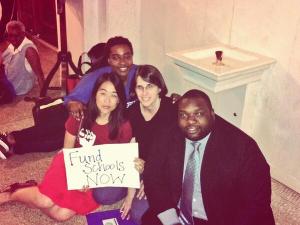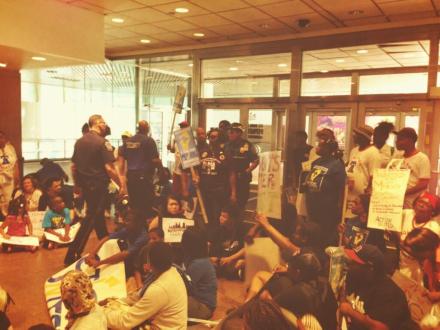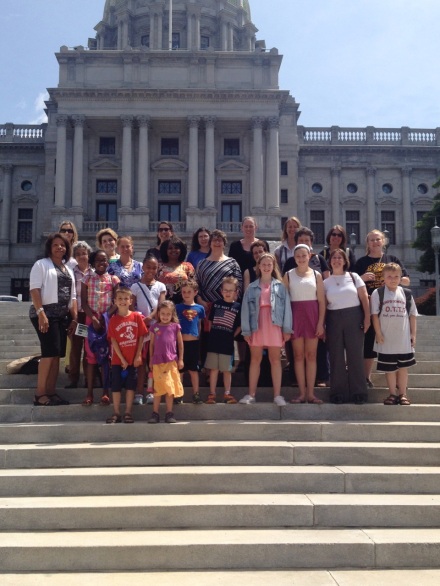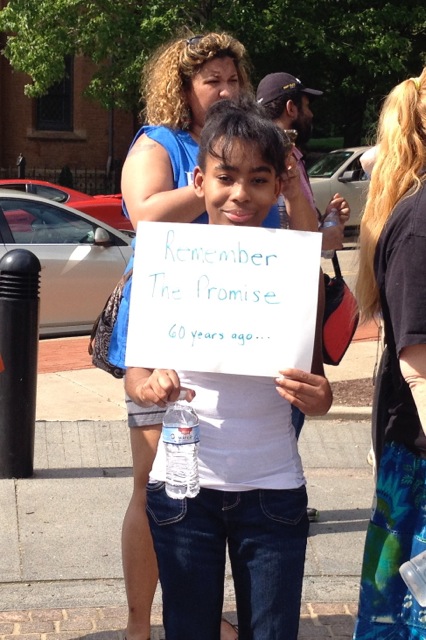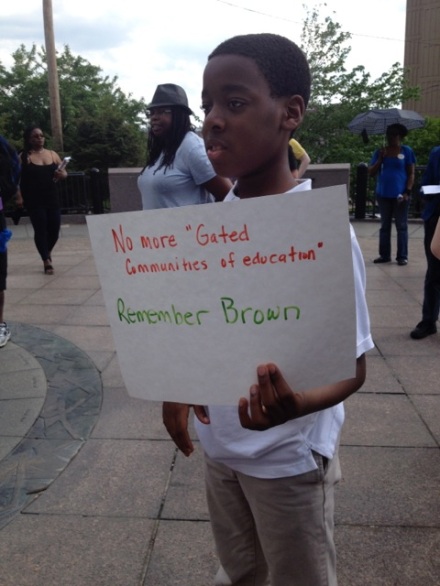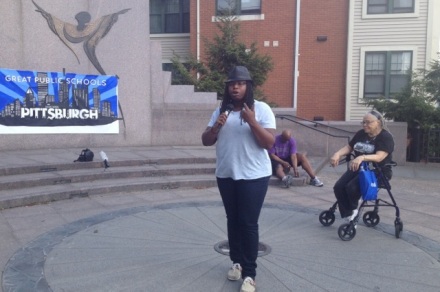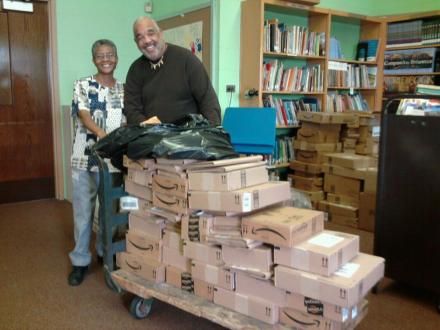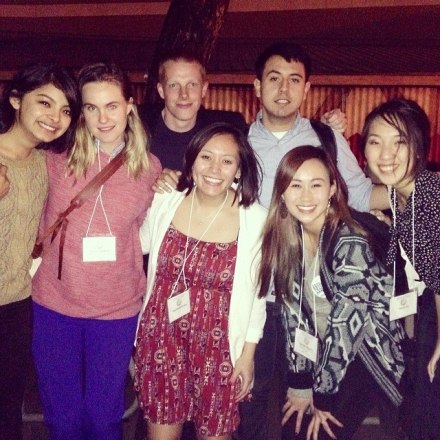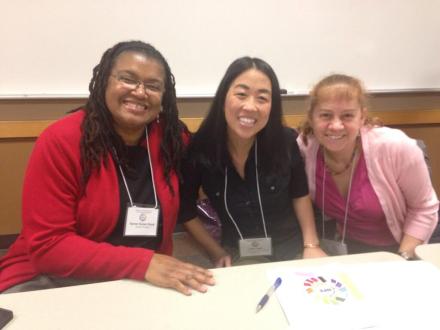It’s spring and the birds are tweeting. And so are education advocates! Do you tweet? I mean in the sense of using Twitter, not singing with sparrows. I found myself dragged rather reluctantly into the Twitterverse just over a year ago. As a historian fond of words, nuance, and careful argument, I find it incredibly difficult to say anything in 140 characters or less. But I’ve had some great teachers (thank you Pam and Sheila!) and have learned to appreciate Twitter’s grassroots power.
Here are just two examples of ways that Twitter can connect and amplify our voices at the state and federal level. If you tweet, please consider taking part!
Twitter Chat on PA Education Funding
Next Tuesday, March 25th at 8PM there will be a “live chat” on Twitter with school leaders from throughout the state. You are invited to join the conversation using the hashtag #PAEdFunding: you can just lurk and learn, or you are welcome to participate and share your thoughts on public education funding. The four hosts are:
- @PASASupts – Pennsylvania Association of School Administrators
- @PSBA – Pennsylvania School Boards Association
- @PASBO_org – Pennsylvania Association of School Business Officials
- @PARSS2go – Pennsylvania Association of Rural and Small Schools
Here’s some good information about twitter chats from the PA School Board Association:
If you’ve never tweeted before, join us. It’s a simple, free and fast-paced way to communicate and share information. Here are directions and a few tips:
How to Get Started: Log-on to www.twitter.com, sign-up, create your profile, find people and organizations you are interested in following and start tweeting out messages in 140 characters or less.
What is a Twitter Chat? Twitter chats happen when a group of people all tweet about the same topic using a specific tag (#), called a hashtag, which allows it to be followed like a transcript on Twitter. The chats are at a specific time, once, and often repeated weekly or bi-weekly at announced times.
Follow the Conversation or Check Back Later: To follow a Twitter chat live or to read the conversation later, log-on to Twitter, click on the #Discover link, then search for #PAEdFunding. By searching for or clicking the hashtag on a tweet, you can see all of the recent tweets on that topic. Then, read, reply and post your own thoughts and messages.
It’s That Easy to Join the Conversation: Tell your friends and colleagues, anyone who wants to learn more about education or wants to join the movement to establish a fair and predictable way of distributing state education dollars to ensure equity and adequate support for all schools regardless of where students live. Join us!
Twitter Storm for a Federal Hearing
The national Network for Public Education (NPE) is calling for congressional hearings into the overuse and misuse of high-stakes testing. Their resolution, passed following the first national conference two weeks ago, has been picking up steam. [For more on that conference, see “We are Many.”] I am pasting the full text of that resolution below, so you have a chance to read the eleven very thoughtful questions that NPE is asking our federal legislators to investigate. But first we need to urge them to hold a hearing.

Tomorrow, Wednesday, March 19th, from 8-10PM, NPE is hosting a “twitter storm.” The idea is to get lots of people tweeting about the same thing at the same time to amplify the message. Learn more about the twitter storm here. You can also use a new tool called, Thunderclap, which calls itself a “crowdspeaking platform that helps people be heard by saying something together. It allows a single message to be mass-shared, flash mob-style, so it rises above the noise of your social networks.” I can report that it only takes a few seconds to sign up to participate in the NPE Thunderclap, which will automatically send a tweet out for you at the same moment as other participants.
Try it tomorrow and let us know how you weather the storm. It must be the promise of spring temperatures because I feel like chirping, I mean, tweeting!
Resolution from the Network for Public Education, March 2, 2014:
We are writing to request that the Health, Education, Labor and Pension Committee hold hearings to investigate the over-emphasis, misapplication, costs, and poor implementation of high-stakes standardized testing in the nation’s K-12 public schools.
Starting with No Child Left Behind legislation in 2001, which mandated standardized testing of every student in grades three through eight, many states have since rolled out testing in additional grades. This emphasis on testing has increased under policies of the Obama administration, such as Race to the Top and the NCLB waivers, that tie test scores to teacher and principal evaluations and school “turnarounds” and closures. There is a danger that tests now seem to have become the purpose of education, rather than a measure of education.
The tests were initiated to measure whether schools were delivering an education of high quality to every child. It makes sense to determine whether all students are achieving at a minimum level of proficiency in English and math, and standardized tests can help discern whether they are.
Our concern is that high-stakes testing in public schools has led to multiple unintended consequences that warrant federal scrutiny, including the following questions, among others.
Do the tests promote skills our children and our economy need? The most popular form of tests today are multiple-choice because they are easy and cheap to grade. But many educators and parents worry that teaching children how to take these tests doesn’t teach them how to think. The new standardized exams from the multi-state testing consortia do not appear to be significantly better, and will likely be scored by computers, which cannot gauge higher order thinking.. The challenges of the future and our nation’s economic success require the ability to solve and identify new problems, think creatively, and work collaboratively with others.
What is the purpose of these tests? Assessments should be used as diagnostic tools, to help teachers figure out where students are in their learning. But in most states, teachers are forbidden to see the actual test questions or provide feedback to students. Teachers do not see how their students answered specific test items and learn nothing about how their students are doing, other than a single score, which may arrive long after the student has left their classrooms. Thus, the tests have no diagnostic value for teachers or students, who do not have the opportunity to review and learn the material they got wrong.
How good are the tests? Problems with the actual content of tests have been extensively documented. There are numerous instances of flawed questions and design, including no right answer, more than one right answer, wording that is unclear or misleading, reading passages or problems that are developmentally inappropriate or contain product placements, test questions on material never taught, and items that border on bizarre, such as a famous example that asked students to read a passage about a race between a pineapple and a hare. Tests are not scientific instruments like barometers; they are commercial products that are subject to multiple errors.
Are tests being given to children who are too young? In many states, high-stakes standardized tests are required for even the youngest school children. In Chicago, for instance, Kindergarten students face four standardized tests two or three times a year and can spend up to a third of their time taking tests. Children of this age typically do not know how to read or even hold a pencil or use a keyboard. Subjecting 5-year-olds to a timed test is not only hopeless from a practical standpoint, but subject children to undue stress.
Are tests culturally biased? Every standardized test in the world is an accurate reflection of socioeconomic advantage and disadvantage. Thus, students from racial and ethnic-minorities, students with disabilities, and students of lower socioeconomic status tend to have lower scores than their more advantaged peers. Further, test results are often used as rationales for closing schools that serve low-income communities of color.
Are tests harmful to students with disabilities? Over the past few years, there have been numerous instances in which children with significant health situations, even undergoing life-saving procedures, were pressured to complete required tests – even from their hospital beds. Children with severe brain disorders have been compelled to take a state test. Recently in Florida, an eleven-your-old boy who was dying in hospice was expected to take a test. Such behavior defies common sense and common decency.
How has the frequency and quantity of testing increased? Testing is taking significant time away from instructional learning time. In Chicago, elementary school students take the REACH, the TRC, the MAP, the EXPLORE, the ISAT, and DIBELS every year. In North Carolina, third-grade students are tested in reading 36 times throughout the year – in addition to other standardized tests. Middle schools students in Pennsylvania may take over 20 standardized tests in a single school year. High school students in Florida can have their instruction disrupted 65 times out of 180 school days by testing. In New York, the time taken by state exams has increased by 128%. When so much time is devoted to testing instead of teaching, students have less time to learn.
Does testing harm teaching? Now that test scores are linked to principal and teacher evaluations in many states, teachers engage in more test prep because they are pressured and afraid, not because they think the assessments are educationally sound. Principals are nervous about their school’s scores. Many educators have admitted they are fearful of taking students on field trips, engaging them in independent projects, or spending time on untested subjects like science or history, art or music because it might take time away from test prep. As a result, the curriculum has narrowed and students have lost their opportunity for a well-rounded education.
How much money does it cost? It is difficult to calculate the entire costs of standardized testing – including the many classroom hours spent on test prep. But it is well known that nearly every state is spending hundreds of millions of taxpayer dollars to develop more high-stakes tests for students, and requiring local districts to spend hundreds of millions more to get their students ready to take them. In addition to the cost of the tests and the interim tests, there are added costs of new curriculum, textbooks, hardware, software, and bandwidth that new tests require. There are also opportunity costs when money allocated for testing supersedes other education expenditures, such as libraries, art and music programs, social workers and guidance counselors, and extra-curricular activities.
Are there conflicts of interest in testing policies? In many states, a company that has a multi-million dollar contract to create tests for the state is also the same company that profits from producing curriculum and test prep materials. In some states, a single testing company has been able to win a contract worth many millions of dollars by lobbying and engaging in backdoor influencing of public officials. In other states, school districts buy textbooks from the same company that makes the tests so their students have an advantage on the tests.
Was it legal for the U.S. Department of Education to fund two testing consortia for the Common Core State Standards? According to federal law and regulations, the U.S. Department of education is not allowed to supervise, direct, or control curriculum or instruction. Yet the funding of testing consortia directly intervenes in the curriculum or instruction of almost every public school in the nation, as the tests will determine what is taught and how it is taught.
We believe that every child in the United States deserves a sound education. Every child deserves a full curriculum in a school with adequate resources. We are deeply concerned that the current overemphasis on standardized testing is harming children, public schools, and our nation’s economic and civic future. It’s our conclusion that the over-emphasis, misapplication, costs, and poor implementation of high-stakes standardized tests may now warrant federal intervention. We urge you to pursue the questions we have raised.




